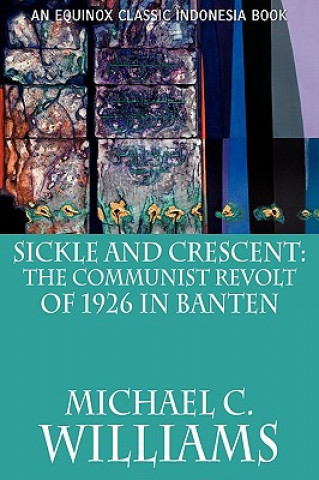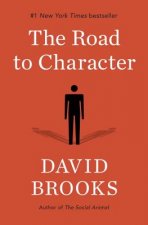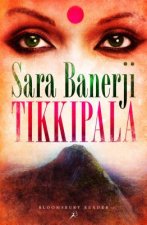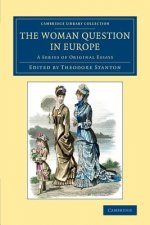
Kód: 09002858
Sickle and Crescent
Autor Michael C. Williams
"Alongside the crescent, the star of the Soviets will be the great battle emblem..." - Tan Malaka Twice in this century the people of Banten have risen in revolt against those they considered to be their ... celý popis
- Jazyk:
 Angličtina
Angličtina - Väzba: Brožovaná
- Počet strán: 116
Nakladateľ: Equinox Publishing (Asia) Pte Ltd, 2009
- Viac informácií o knihe

Mohlo by sa vám tiež páčiť
-

The Road to Character
24.42 € -20 % -

Acquisitions of the Spirit
33.52 € -

Tikkipala
23.60 € -

Woman Question in Europe
75.74 €
Darujte túto knihu ešte dnes
- Objednajte knihu a vyberte Zaslať ako darček.
- Obratom obdržíte darovací poukaz na knihu, ktorý môžete ihneď odovzdať obdarovanému.
- Knihu zašleme na adresu obdarovaného, o nič sa nestaráte.
Viac informácií o knihe Sickle and Crescent
Nákupom získate 106 bodov
 Anotácia knihy
Anotácia knihy
"Alongside the crescent, the star of the Soviets will be the great battle emblem..." - Tan Malaka Twice in this century the people of Banten have risen in revolt against those they considered to be their oppressors. On both occasions the leadership of the revolts was largely religious and yet at the same time announced to all that it was Communist. The revolutionary leadership successfully portrayed their ideology as both past and future. In 1926 and again in 1945, revolt was to be the harbinger of freedom from colonial rule and the dawn of a new era of social justice and prosperity. These are familiar themes of Communist-inspired revolt, but the Bantenese revolutionaries also delved deep into their past history to proclaim that the advent of Communist revolt would also lead to the restoration of the Sultanate of Banten. The Banten region illustrates strikingly that the movement from "archaic" to modern forms of political protest is not lineal but dialectical. As Geertz has perceptively remarked, "there is in such matters no simple progression from 'traditional' to 'modern,' but a twisting, spasmodic, unmethodical movement which turns as often toward repossessing the emotions of the past as disowning them." This dialectical connection between future, present, and past was evident not only in the ideology of the two main revolts, but also in the social composition of the revolutionary leadership. In both uprisings descendants of the former Sultans of Banten, called tubagus, and others holding noble titles they had borne from old, played a prominent role. Indeed one of the very first actions of the Indonesian Communist Party (PKI) branch in 1925 was to demand compensation and pensions for all who bore the title tubagus from a sultanate abolished nearly a century before. They rubbed shoulders in the revolutionary leadership with other traditional leaders of peasant revolt, such as the Islamic teachers, the ulama, and the local men of violence, the jawara, but also with more "modern" revolutionaries such as artisans, printers, journalists, and trade unionists. In short, the uncompromising insistence on modernity that was to be a hallmark of the PKI after 1951 was certainly not a prominent feature of the movement in the 1920s or in 1945.
 Parametre knihy
Parametre knihy
Zaradenie knihy Knihy po anglicky Humanities History Regional & national history
42.92 €
- Celý názov: Sickle and Crescent
- Podnázov: The Communist Revolt of 1926 in Banten
- Autor: Michael C. Williams
- Jazyk:
 Angličtina
Angličtina - Väzba: Brožovaná
- Počet strán: 116
- EAN: 9786028397537
- ISBN: 9786028397537
- ID: 09002858
- Nakladateľ: Equinox Publishing (Asia) Pte Ltd
- Hmotnosť: 182 g
- Rozmery: 229 × 152 × 7 mm
- Dátum vydania: 16. December 2009
Obľúbené z iného súdka
-

Hundred Years' War on Palestine
13.28 € -23 % -

Ethnic Cleansing of Palestine
12.87 € -24 % -

History of Japan
16.35 € -19 % -

Ten Myths About Israel
13.59 € -14 % -

Strange Death of Europe
15.22 € -21 % -

Decline and Fall of the Roman Empire
5.92 € -21 % -

Secret History
13.79 € -21 % -

God's Playground A History of Poland
68.68 € -

Mayflower
15.73 € -23 % -

How to be a Victorian
14.40 € -23 % -

Plantagenets
13.28 € -29 % -

General's Son
20.23 € -4 % -

Iran: A Very Short Introduction
11.54 € -19 % -

Temples of Karnak
153.53 € -

Twenty Years A-Growing
10.11 € -22 % -

Cuneiform
12.97 € -10 % -

History of Witchcraft in England from 1558 to 1718
19 € -

China in Africa
37.40 € -

Islandman
11.13 € -19 % -

Bohemian Paris
16.55 € -18 % -

Alexiad
17.78 € -20 % -

Lancaster And York
22.89 € -

Modern France: A Very Short Introduction
11.54 € -19 % -

Inside Hitler's Greece
21.05 € -20 % -

Diana: Her True Story - In Her Own Words
11.03 € -23 % -

The Fourth Turning
19.62 € -6 % -

The Oxford History of Ancient Egypt
17.98 € -19 % -

Churchill: The Power of Words
15.12 € -22 % -

Palestine
20.33 € -19 % -

Korean History in Maps
28 € -10 % -

Great Gatsby (Wisehouse Classics Edition)
16.14 € -37 % -

Viking Way
46.19 € -7 % -

The Thirteenth Tribe
12.56 € -

My Promised Land
18.49 € -

Vanished Kingdoms
18.80 € -22 % -

Age Of Revolution
16.55 € -23 % -

Life and Death of Anne Boleyn
22.99 € -

Coming of the Third Reich
18.70 € -23 % -

Children of Ash and Elm
18.70 € -23 % -

Europe Between the Oceans
34.23 € -7 % -

Socialism Betrayed
19.51 € -19 % -

303 Squadron
19.41 € -17 % -

Ancient Celts, Second Edition
26.77 € -19 % -

Dancing in the Glory of Monsters
15.83 € -22 % -

Battle of Britain: Luftwaffe Blitz (Images of War)
25.85 € -1 % -

Age of Confucian Rule
35.97 € -

Beyond Band of Brothers
16.55 € -23 % -

Benjamin Franklin
18.80 € -12 % -

On China
17.27 € -20 %
Osobný odber Bratislava a 2642 dalších
Copyright ©2008-24 najlacnejsie-knihy.sk Všetky práva vyhradenéSúkromieCookies



 21 miliónov titulov
21 miliónov titulov Vrátenie do mesiaca
Vrátenie do mesiaca 02/210 210 99 (8-15.30h)
02/210 210 99 (8-15.30h)